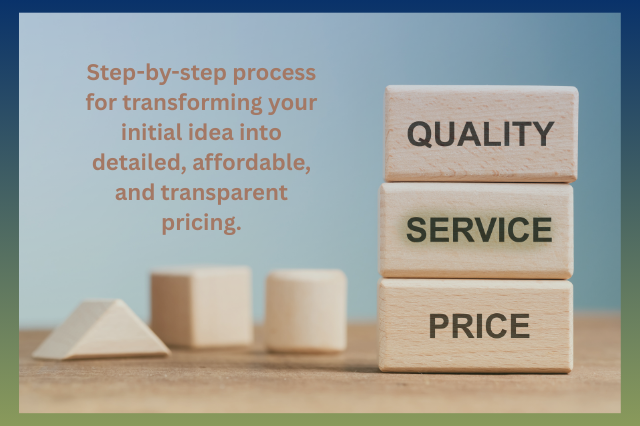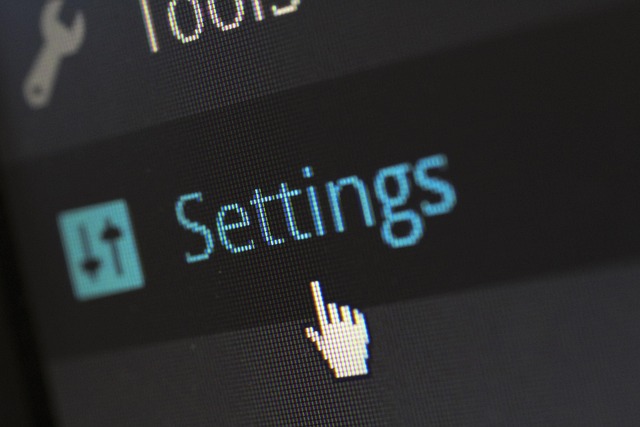Why a Website is Non-Negotiable for Modern Business Credibility
Modern Business Credibility
You’ve poured your heart and soul into your business.
Your product is exceptional, your service is unmatched, and your passion is undeniable.
You’re active on Instagram, posting regularly on Facebook, and maybe even dabbling in TikTok.
Then, a promising lead messages you: “This looks amazing! Can you send me a link to your website? I want to learn more about your process.”
Your stomach sinks. You don’t have one. You fumble to send them your Instagram profile link, hoping it’s enough.
Sound familiar?
In that critical moment, you’ve lost control of the narrative.
You’re hoping a social media algorithm, designed for scrolling and liking, will do the hard work of convincing a stranger to trust you with their time and money.
Let’s be brutally honest:
In today’s digital-first world, if you don’t have a website, your business is virtually invisible.
Relying solely on social media is like building your house on rented land.
You don’t control the rules; the landscape can change overnight, and you can be evicted without warning.
Your website is different.
It’s your deed. It’s your forever asset. And most importantly, it is the non-negotiable foundation of your business’s credibility.
Here are the five undeniable reasons why a professional website is not a “nice-to-have” but an absolute essential for building trust, establishing legitimacy, and driving growth.
1. Your Website is Your Always-Open Digital Storefront
Think about your own habits.
When you hear about a new local restaurant, a freelance designer, or a new software tool, what’s the first thing you do?
You Google it.
Your customers are no different. Their first interaction with your brand is almost always a digital one. Your website is that first interaction; it’s your modern-day handshake.
It Works 24/7/365: Unlike a physical storefront with opening hours or your own limited working hours, your website is always on. It’s generating leads, taking inquiries, and showcasing your work while you sleep, take a day off, or focus on other projects. It’s your hardest-working employee that never calls in sick.
You Control the First Impression: A social media profile forces your brand into a template. A website is your blank canvas. You control the colors, the messaging, the flow, and the entire user experience. You can guide a visitor on a journey designed specifically to convert them into a customer, something a chaotic social media feed can never do.
The Central Hub for Information: A potential client needs to know your hours, your location, your prices, your story, and your FAQs. Trying to cram all of that into an Instagram bio is impossible. Your website is the comprehensive, organized home for everything a customer needs to know to make an informed decision.
Without a website, you are missing potential customers at all hours of the day and leaving that critical first impression to chance.
2. Build Trust and Legitimacy with a Professional Online Hub
Trust is the currency of business.
Before anyone buys from you, hires you, or partners with you, they need to trust you.
In the digital world, your website is your primary indicator of trust.
A lack of a website, or a poorly designed one, sends a message of unreliability and amateurism.
Conversely, a professional website acts as a powerful trust anchor, signaling that you are a legitimate, established entity.
Key elements of a website that build instant credibility include:
A Professional Domain Name: An email address like
yourbusiness@gmail.compales in comparison toyourname@yourbusiness.com. A custom domain name (www.yourbusiness.com) is inexpensive and instantly makes your operation look more professional and permanent.A Clean, Modern Design: You don’t need a $10,000 custom design. Modern website builders like Wix, Squarespace, or WordPress with Elementor offer stunning, mobile-responsive templates. A clean, easy-to-navigate design shows you care about the customer experience.
Essential “Trust Pages”:
An “About Us” Page: This is where you connect on a human level. Share your story, your mission, and your face. People buy from people, not from faceless entities.
A Clear “Contact Us” Page: Make it easy for people to get in touch. A physical address, a phone number, and a simple contact form reduce friction and anxiety for potential clients.
Social Proof: This is arguably the most powerful trust-building tool you have. Your website is the perfect platform to host:
Customer testimonials and reviews
Case studies showing your process and results
A portfolio of your past work
Logos of clients you’ve worked with or publications you’ve been featured in
A website gives you the space to systematically address and overcome the natural objections and hesitations a new visitor might have.
3. Stop Renting, Start Owning: Your Website is Your Digital Asset
This is the most critical strategic reason to have a website.
Social media platforms are rented land. Your website is owned land.
What happens if Instagram changes its algorithm again and your reach plummets to zero? What if Facebook accidentally disables your account and you can’t get it back? It happens every day to businesses that have built their entire presence on a platform they don’t control.
Your website is an asset you own outright. It’s your equity. You make the rules.
You Are Algorithm-Proof: Google’s algorithms change, but they are designed to reward quality content on websites. A social media platform’s algorithm is designed to keep users on their platform, not to send them to you. With a website, you can build SEO value that compounds over time, independent of the whims of Mark Zuckerberg or Elon Musk.
You Own Your Audience and Data: On social media, you don’t own your follower list. You can’t easily download it or message them all directly. With a website, you can build an email list—an asset you own and control 100%. Email marketing offers direct access to your most engaged audience and has an incredible return on investment.
Brand Consistency: Your website acts as the central hub of your entire marketing universe. All your social media channels, your Google My Business profile, your YouTube videos, and your paid ads should ultimately point back to your website. This is where the magic happens—where a visitor becomes a lead and a lead becomes a customer.
Building your business on a platform you don’t control is a massive risk. Your website is your safe, stable, and permanent home on the internet.
4. Amplify Your Reach: A Website is the Engine for SEO and Marketing
How will new customers find you if they aren’t already following you on social media?
The answer is Search Engine Optimization (SEO).
Without a website, you are opting out of the largest referral system in the world: Google Search. Millions of people are typing queries into Google right now, looking for the exact products or services you offer. Without a website, they will never find you.
The Foundation of SEO: You cannot rank in Google search results without a website. By creating service pages, blog posts, and product pages optimized around keywords your ideal customer is searching for (e.g., “best vegan bakery in Austin,” “affordable interior designer,” “how to fix a leaky faucet”), you attract a steady, targeted stream of free, organic traffic.
The Hub for All Marketing Efforts: Every single marketing campaign you run will be more effective with a website.
Paid Ads (Google/FB Ads): Running ads without a website to send traffic to is like hosting a party with no house. Your website is where you convert the ad click into a sale.
Email Marketing: Your newsletters need to link back to your website’s blog articles, new product pages, or special offers.
Physical Marketing: Flyers, business cards, and brochures are far more effective with a clear, memorable website URL directing people to a full experience.
Tracking and Analytics: With a website, you can install free tools like Google Analytics. This allows you to move from guessing to knowing. You can see:
How many people are visiting your site
Where are they coming from
What pages do they spend the most time on
What actions do they take
This data is marketing gold, allowing you to double down on what’s working and fix what isn’t. Without a website, you are marketing in the dark.
5. Convert Visitors into Customers: Your Website is Designed to Drive Action
A social media feed is designed for passive consumption.
A website is designed for intentional action.
Every element on your website can be strategically crafted to guide a visitor toward a specific goal—a concept known as a Call to Action (CTA).
Your website is your ultimate sales and conversion machine.
Strategic Calls to Action: Unlike a social media bio with one static link, your website can have multiple, context-specific CTAs designed to meet users where they are in their journey.
“Book a Free Consultation”
“Download Our Free Price Guide”
“Buy Now and Save 15%”
“Sign Up for Our Newsletter”
“View Our Full Portfolio”
Detailed Storytelling and Objection-Handling: You have the space to tell your full story, detail your process, showcase dozens of portfolio pieces, and list out extensive FAQs. This content is designed to answer questions, overcome doubts, and build so much value that the decision to contact you or buy from you becomes an easy one.
E-commerce and Booking Functionality: For many businesses, the website isn’t just a brochure; it’s the primary point of sale. You can integrate seamless checkout systems, booking calendars, and appointment schedulers, turning casual browsers into paying customers instantly, without any manual intervention from you
A website is a purposeful environment designed for a single goal: to turn visitors into customers. Social media is designed for scrolling.
"But I Don't Have the Time/Money/Skills!"
This is the most common objection, and it’s understandable.
This is the most common objection, and it’s understandable. But it’s also based on outdated information.
Cost: This is an investment, not an expense. The cost of a basic website (domain name + hosting + builder platform) is often less than $300 per year. Compare that to the cost of a single missed client project, which could be thousands of dollars. The ROI is undeniable.
Time/Skills: You do not need to be a tech genius. Modern website builders (Wix, Squarespace, Weebly, Shopify) are incredibly user-friendly with drag-and-drop interfaces. You can have a stunning, professional-looking site built in a weekend. If you truly don’t have the time, hiring a freelance web designer for a simple 5-page site is a manageable and worthwhile investment.
Your Business Deserves to Be Found
Your business is more than a social media profile.
It’s a dream, a livelihood, and a solution to someone’s problem.
It deserves a permanent home where it can grow, build trust, and serve customers on its own terms.
- Stop leaving your credibility to chance.
- Stop renting your digital presence.
- Stop being invisible to the customers who are searching for you right now.
Build your website. Own your asset.
Establish your credibility. Your future customers are waiting to find you.





